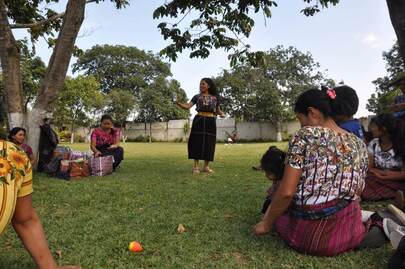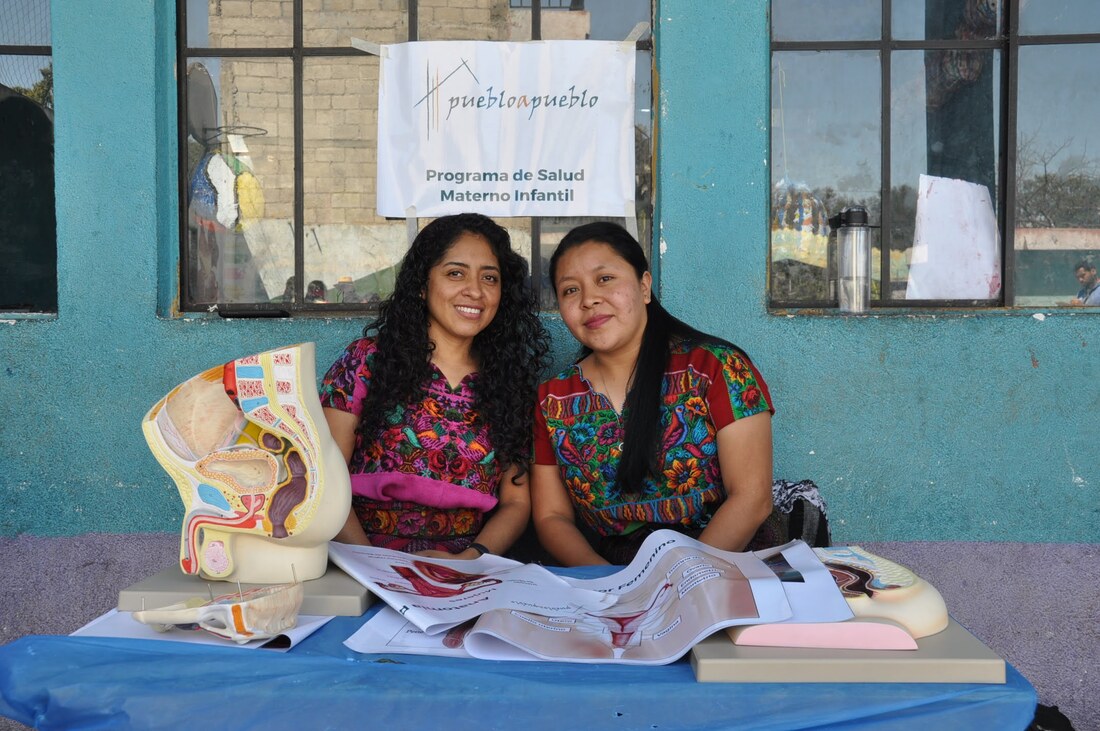 Vilma at the 2019 Maternal-Child Health end of year celebration
Vilma at the 2019 Maternal-Child Health end of year celebration The Maternal-Child Health project supports the health of mothers and their babies by allowing them to access medical services, education, and home visits from Pueblo a Pueblo. These three components go hand in hand because our main goal since the Maternal-Child Health project began has been to improve the health behaviors of pregnant women. Furthermore, our goal has been to support maternal-child health as a means to decreasing the rates of both maternal and infant mortality in the region. To do this, we aim to increase access to qualified providers, medical coverage, and various methods of family planning. As a part of this project, the children also have complete access to medical care, which in rural communities is extremely important. In these rural communities, there are small health outposts but they often do not have all of the needed resources to care for patients. Therefore, having access to a secure health clinic is vital to the health of the mothers and children in our project.
In your opinion, what are some of the greatest successes of this project? In other words, what would you say is the greatest impact the project has on mothers and children?
One of the biggest successes that the project has had is that the mothers have experienced a growth in knowledge. Apart from the increased access to medical services, one of the biggest successes of the project has been that the children are growing up healthy. And, one of the things that we have seen and what the mothers have told us is that it is easy to go to a medical outpost in a rural area where they will tell you “we don’t have the medicine you need.” Additionally, at these rural medical outposts, there often is not a doctor, only a nurse. But, in this project, the women come to Santiago Atitlán, and the only thing that they have to worry about is their transportation and then they have complete access to the medical clinic here. So, one of the biggest successes is that the mothers have gained access to high quality medical services and medicines. If I had to choose, I would say that there are two main successes of the project –access to quality medical services and health education. Education has been extremely important for our mothers because this has allowed them to change their ways of thinking; it has opened them up to new ideas and helped them grow as individuals.
Recently, yourself and other project leaders have decided to change the focus and duration of the project. Can you share some details about this decision as well as the renewed goal for the project?
First I will comment on the decision as it was made from an organizational standpoint. Internally, in the past years we have recognized that there are not enough sponsors that would like to sponsor our mothers for the five year duration of the project. Additionally, it seems like people do not think that supporting health is that important. However, here in Guatemala, in a country that is still in the process of developing, extreme poverty is very prevalent. We have seen that here in Santiago, it is a priority to support families not only in terms of their general health, but especially in their nutritional health. We can help families by giving them access to the clinic, but if a child is sick with the same condition every month –for example, if a child comes in each month with diarrhea or lesions on the skin, there is a bigger problem. I spoke with one of the doctors at the clinic, and I asked her, “why do we see the same problems every month?” She told me, “aside from a lack of hygiene, there is a big lack of vitamins. If a child comes in this month, I can give them vitamins and medicine and they will get better but if the child doesn't have food, next month they will have the same problem.” So, we have recognized that it is a priority to reduce childhood malnutrition, especially from birth until two years of age.
Can you say a little bit more about the changes to the duration of the project –the switch from five years to three years?
With a renewed focus on nutrition, we also evaluated the length of the project. The first two years of a child’s life are the most important to ensure that the child grows up with a strong nutritional foundation. This foundation will help the child develop physically and mentally, so that later on, when they are in school, they can perform better. Additionally, we have seen that after the first two years, many of the children do not use the medical services as much. So, for these reasons we have decided to change the length of the project: first so that it is accessible to more mothers and children, and second so that the mothers recognize that nutrition is extremely important. We are not only going to focus on the child's health, but on their nutrition. We believe that this focus within the first two years will set the child up for a healthier life and a higher performance in school later on. Here, we have seen that many children are sick and underweight because of malnutrition. So, if we don’t focus on nutrition, then we are not attacking the problem from its root. For precisely this reason, we believe it is important to adjust the project to focus more on supporting nutrition. As always , our focus is maternal-child health, we have just added a special focus on the nutrition of our children and also our mothers during their pregnancies. When we begin working with pregnant mothers, we see that they are malnourished as well, and if there is no food security during the pregnancy, they are not going to be able to have a health pregnancy nor a healthy baby. So, this is the rationale for the shorter duration of the project and the enhanced focus on nutrition.
With regards to the sponsorship side of the project, what would you like a prospective sponsor to know?
What would I say to someone who is considering sponsoring one of our mother-child pairs?… well, I would say that here in Guatemala, we need this help. In the rural areas, we need people that want to help families by contributing to their health. I would also like to tell someone considering becoming a sponsor that we, as leaders of the project, are not going to let down our sponsors nor our mother-child pairs. We want to support our fellow Guatemalan families. Here in Guatemala, we have a very precarious health system and a very corrupt government system. This corruption, many times, makes it so that our Guatemalan families do not have the same opportunities. So what I would say is that we need this support, and that they should never think that by contributing to the health of a mother, they are not doing much. On the contrary, this sort of help means so much. What they are doing is contributing a part of their own income to improving the health, the life, of a mother and child here in Guatemala.
Do you have anything else that you would like to share about the project, the sponsorships, or anything else you would like to mention?
Well, I would just say that we are crossing our fingers that we can find more sponsors for this project. We want to be able to serve more mothers and children in the area, but we need sponsors first.


 RSS Feed
RSS Feed